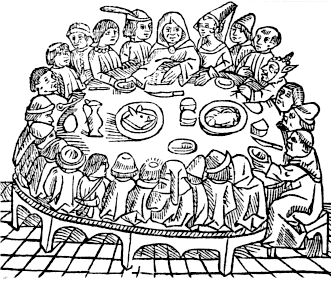Month: February 2014
Bad News About Mooning
So, following up on William’s observation, I looked up “moon, v.” in the Oxford English Dictionary to see whether the particular meaning we were interested in (“to expose one’s buttocks”) would have been available during Chaucer’s day. Sadly, the answer is no.
(If we follow the trail the OED gives us [cf. moon, n, 14], we get closer: 1756.)
That doesn’t mean the concept isn’t available to Middle English readers, of course, but we do want to be careful not to import a particular linguistic meaning anachronistically. This is a great reminder that the Oxford English Dictionary (available for us through the library; from the main page, click on “databases by name,” then “Oxford English Dictionary”) is a fantastic resource and an indispensable one for close reading.
Keep this is mind for your close reading assignment!

Chaucer in Middle English

Since we read the Old English Beowulf in Seamus Heaney’s translation, the move to untranslated Middle English will be jarring. We’ll talk about this in class, but I also want to post a few links to resources here that might be useful as you begin to familiarize yourself with Chaucer’s language.
Here are links to audio files of experts reading sections of The Canterbury Tales. (Sorry, it’s not that Tom Hanks.) Audio Files
These lessons get into more detail than we can in this survey, but they’re very useful if you’re interested in learning more about Middle English: Middle English lessons
A great overview of Middle English linguistics from the Oxford English Dictionary: OED
The Middle English dictionary (also linked to in weekly assignment 2): ME Dictionary
Finally, a parallel text with a pretty good translation of the General Prologue into modern English. Remember to always use such translations to help with reading the text in the original (not as a substitute): Parallel text



